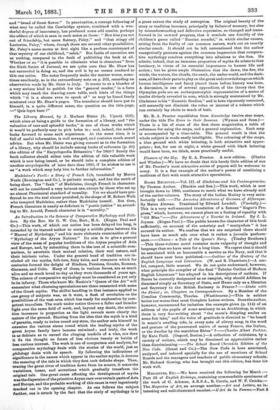An Introduction to the Science of Comparative Mythology and Folk-
'lore. By the Rev. Sir G. W. Cox, Bart., M.A. (Kegan Paul and Co.)—This work, of which our notice has been delayed too long, is intended by its learned author to occupy a middle place between his ." Manual of Mythology," and his more elaborate examination of the 4' Mythology of the Aryan Nations." Its aim is to give a general view of the mass of popular traditions of the Aryan peoples of Asia and Europe, and, by submitting them to the test of a scientific com- parison, to ascertain their mutual relation, their real nature, and their intrinsic value. Under the general head of tradition are in- cluded all the myths, folk-lore, fairy tales, and romances which for centuries formed the delight of Hindoos, Persians, Greeks, Romans, *Germans, and Celts. Many of these, in various forms, are as much alive and as much loved to-day as they were thousands of years ago. The science of comparative mythology must be considered as yet only in its infancy. Those who know Mr. Ruskin's "Queen of the Air" will remember what charming speculations are there connected with some of the Greek myths. The skilful handling in that instance applied to one group of subjects was, as it were, a flash of revelation on the possibilities of the vast area which lies ready for exploration by com- Petent travellers. The work under notice throws a fuller and broader light over the same field of work, and, beyond any doubt, the attrac- tion increases in proportion as the light reveals more clearly the mature of the ground. Starting front the idea that the myth is a kind of parasite, ready to twine round any stem, the author sets himself to examine the various stems round which the leading myths of the great Aryan family have become entwined ; and truly, the work is as delicate as to uncurl the clinging tendrils of a vine, nor does it fix the thought on forms of less obvious beauty or habits of less curious interest. The work is one of comparison and analysis, for -comparative mythology deals with the stories of the world, just as ,philology deals with its speech. By following the indications of .significance in the names which appear in the earlier myths, it detects the meaning of the tale in which they first took definite shape. Then, *bracing the great river of tradition down from its source, it notes the variations, losses, and accretions which gradually transform the original tale. One great cause affecting the development of myths was the dispersion of the primitive Aryan race over certain parts of Asia and Europe, and the probable working of this cause is very ingeniously tracked out in the opening chapter. As one follows the subject farther, one is struck by the fact that the study of mythology is to a great extent the study of corruption. The original beauty of the story or tradition becomes, principally by failure of memory, but also by misunderstanding and defective expression, so changed and trans- formed in its onward progress, that it reminds one forcibly of the children's game called Russian scandal," in which similar causes, arising from the frailty of our common nature, work out an exactly similar result. It should not be left unmentioned that the author energetically protests against the common impression that compare.- tive mythology resolves everything into allusions to the Sun. He admits, indeed, that an immense proportion of myths do relate to that luminary, in virtue of its essential importance to human life and action ; but he gives ample illustration that the dawn, the fire, the winds, the waters, the clouds, the earth, the under-world, and the dark- ness, all have their parts to play on the great and crowded stage on which human intelligence and fancy placed them before history was born. A discussion, in one of several appendices, of the theory that the Olympian gods are an anthropomorphic representation of a series of truths divinely revealed to man, which is strongly maintained by Mr. Gladstone in his" Homeric Studies," and is here vigorously contested, will assuredly not diminish the value or interest of a volume which can certainly lay claim to much of both.


































 Previous page
Previous page